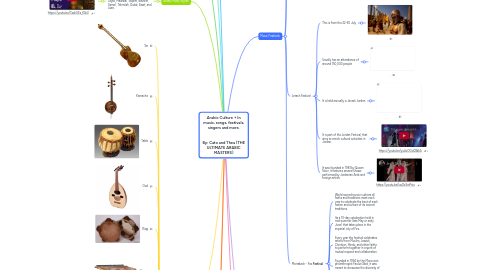
1. Amr Diab
1.1. History:
1.1.1. Born in Port Said, Egypt.
1.1.2. Born on October 11, 1961
1.1.3. His parents are Roqiyya Mohammad Mahmoud Fouad and Abdel-Baset Diab.
1.1.4. He has 4 children: Nour Diab, Abdallah Diab, Kinzy Diab and Jana Diab.
1.2. Songs:
1.2.1. Nour El Ain Tamally Ma3ak Yetalemo
1.2.1.1. https://youtu.be/EgmXTmj62ic
1.2.1.2. https://youtu.be/A6H5Xx2nFvM
1.2.1.3. https://youtu.be/KLJA-srM_yM
2. Elissa
2.1. History:
2.1.1. Elissa was born in Deir Al-Ahmar to a Lebanese father and a Syrian mother from Wadi al-Nasara. She has three brothers Ghassan, Kamil and Jihad and two sisters Norma and Rita. Elissa was raised in the Beqaa Valley with her other siblings. She graduated from the Lebanese University with a degree in political science.
2.2. Background:
2.2.1. Elissa, whose real name is Elissar Khoury, is one of the highest-selling female Arabic artists in the Middle East, with millions of records sold worldwide.
2.2.1.1. She began her musical career after studying politics at Lebanese University, and first gained attention after winning a silver medal at a Lebanese music competition, Studio El Fan. Since then, the 46-year-old has released 11 studio albums and has won multiple awards for her work
2.3. Songs:
2.3.1. No. - Title - Original album 1. "Salimli Aleh" - Tesada'a Bemeen (2009) 2. "Betmoun" - Ayami Beek (2007) 3. "Aa Bali Habibi" - Tesada'a Bemeen (2009) 4. "Kermalak" - Bastanak (2006)
2.3.1.1. https://youtu.be/AkmjKQJCpy0
3. Arabic music history:
3.1. Arabic music has been known to exist in preIslamic period between the 5th and 7th centuries in the form of oral poetry accompanied by a drum or oud respecting the poetic meter. Songs were simple using only one maqam or melody.
3.2. For many centuries, the Arabs of Hejaz recognized that the best real Arabian music came from Yemen, and Hadhrami minstrels were considered to be superior. Pre-Islamic Arabian Peninsula music was similar to that of Ancient Middle Eastern music.
4. Arabic Music Styles:
4.1. Maqam al-iraqi, Andalusi nubah, Muwashshah, Fijiri songs, Qasidah, Layali, Mawwal, Taqsim, Bashraf, Sama'i, Tahmilah, Dulab, Sawt, and Liwa.
4.1.1. https://youtu.be/CwbGEx_fSbU
5. Arabic Instruments
5.1. Tar
5.2. Kamache
5.3. Tabla
5.4. Oud
5.5. Riqq
5.6. Kanun
5.7. Ney
5.8. Zurna
5.9. Darabuka
5.10. Santur
5.11. Saz
5.12. Davul
6. Why Arabic music is different?
6.1. There is a thing called “The Arabic Scale,” but real Arabic music is usually based on something called “The double harmonic scale.” the double harmonic scale sounds different than the major scale because it replaces several major notes with flat notes and sharp notes - half steps up and down from our own scale.
7. Western Vs Arabic Culture:
7.1. https://www.arabnews.com/node/2082061/saudi-arabia
8. Music Festivals:
8.1. International festival of **Carthage**
8.1.1. Is an Annual music festival taking place in July and August since 1964 in the coastal city of Carthage in Tunisia.
8.1.2. The festival includes theatre and dance shows and musicals from Tunisia and around the world.
8.1.2.1. https://youtu.be/dnLaHeAl9ws
8.1.3. Many arabic singers sing at the festival including: Iraqi, singer Kathem al-Saher. Lebanese singer, Melham Zein Egyptian singer, Amr Diab.
8.2. Baalbeck International **Festival:**
8.2.1. THE BAALBECK INTERNATIONAL FESTIVAL IS THE OLDEST AND MOST PRESTIGIOUS CULTURAL EVENT IN THE MIDDLE EAST WITH A HISTORY EXCEEDING SIX DECADES.
8.2.2. The Baalbeck International Festival was initiated in 1956 u It was acknowledged that the glory of the Roman temples surrounding the festival would be a unique setting and would have an important cultural, touristic and socio-economic impact on Lebanon and the city of Baalbeck
8.2.3. 1975 – 1996: The Festival’s activities were suspended for 22 years due to the Lebanese Civil War. During this period, the committee published, a luxurious book of 300 pages “Les riches Heures du festival” (1994) that features the history of the festival, spectacular photos of performances as well as testimonies of great artists who performed at Baalbeck. In 1998, the festival also published an exhaustive book on the Lebanese theatre.
8.2.3.1. https://youtu.be/hO_mZzFeSm0
8.2.4. 2020 – 2021 The years of the pandemic: The Baalbek Festival has remained true to its calling as a beacon of culture, adapting to the restrictions of the pandemic as well as to the new economic realities on the ground. The Festival’s 2020 and 2021 editions, with “Sound of Resilience’ and “Shine on Lebanon “, streamed on-line reached an astonishing 17 million viewers, the largest ever for a cultural event beaming from Lebanon’s unique Roman temples to the world!
8.3. Jerash Festival
8.3.1. This is from the 22-30 July
8.3.1.1. .
8.3.2. Usually has an attendance of around 150,000 people
8.3.2.1. .
8.3.3. It is held annually is Jerash Jordan
8.3.3.1. .
8.3.4. It is part of the Jordan Festival, that aims to enrich cultural activities in Jordan.
8.3.4.1. https://youtu.be/yuAvOGoQWkA
8.3.5. It was founded in 1981 by Queen Noor, it features several shows performed by Jordanian Arab and foreign artists
8.3.5.1. https://youtu.be/lusOxSmPsio
8.4. Marrakech - Fes **Festival**
8.4.1. World sacred music is where all faiths and traditions meet each year to celebrate the best of each nation and culture of its sacred traditions.
8.4.2. Its a 10-day celebration held in mid-summer (late May or early June) that takes place in the imperial city of Fes.
8.4.3. Every year the festival celebrates artists from Muslim, Jewish, Christian, Hindu, and other faiths to perform together in a spirit of mutual respect and collaboration.
8.4.4. Founded in 1994 by the Moroccan philanthropist Faouzi Skali, it was meant to showcase the diversity of spiritual music around the world.
8.4.5. It also promotes lesser known talents and their creative projects.
8.4.6. The event is dedicated to knowledge, art, and spirituality, featuring artists from the Middle East, Africa, Asia, and Western Europe. The festival has featured Joan Baez, Patti Smith, Björk, Ben Harper, Paco de Lucía, Ravi Shankar, Sabah Fakhri, Kadhem Saher, Mounir Bachir, Wadi al Safi, Jean-Claude Casadesus, and many others.
